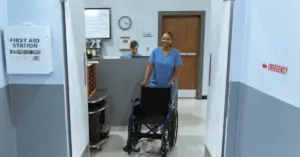As tax season rolls around each year, travel nurses face the arduous task of navigating state taxes, deductions, and multi-location income. Don’t let taxes take you by surprise!
Read on for essential tax tips that save travel nurses money.
Understanding Your Tax Home
Your “tax home” sets the stage for travel expense deductions. This is typically:
- The area surrounding your regular place of employment, not your family home location.
- Where you spend the bulk of your working time regardless of temporary contracts elsewhere.
Having a defined tax home allows for maximizing write-offs for nurses temporarily assigned across state lines.
Maximize Travel Expense Deductions
You can deduct many travel expenses while away from your designated tax home:
- Lodging – Deduct hotels, short-term rentals, and temporary housing while on assignment.
- Meals – Claim up to 50% of meal costs while traveling for work.
- Mileage – Deduct mileage commuting for assignments outside your tax home area using the current standard rate.
- Incidentals – Things like tips for baggage handlers and transportation to assignments are deductible.
Thoroughly documenting these travel expenses ensures capturing all entitled deductions.
Maintain Meticulous Records
Keeping pristine records provides proof if ever audited. Be sure to:
- Save all receipts, both physical and digital copies.
- Log every work expense immediately in accounting software.
- Write detailed descriptions including purpose, date, location, and amount.
- Retain records for at least 7 years in an organized, accessible system.
Complete documentation is your best defense and essential for maximizing deductions.
Write Off Job-Related Expenses
Many work-specific expenses—often overlooked–are deductible:
- State nursing license renewals and costs associated with transferring licenses between states.
- Continuing education tuition for maintaining credentials and learning new skills.
- Travel uniforms, scrubs, and nursing shoes if required by your employer.
- Medical instruments like stethoscopes and blood pressure monitors.
- Malpractice insurance premiums.
- Networking, resume, and job search costs incurred between contracts.
Tracking these reductions lowers your taxable income.
Understand State Tax Policies
With multi-state income, state taxes get complicated:
- Research each state’s income tax rates—some levy no taxes at all.
- Determine if you need to file a resident or non-resident return for the states worked in.
- See if reciprocity agreements exist between neighboring states to prevent double taxation.
- Adjust withholdings using Form W-4 if working in a state for a short duration.
State tax intricacies require added research and precautions.
Get an Accountant
Consulting a tax professional with travel nurse expertise can prove invaluable:
- An accountant provides guidance to maximize obscure deductions.
- They assist with multi-state filing intricacies and avoid costly mistakes.
- If audited, a tax pro can manage the process and represent your interests.
Don’t leave money on the table. Seek expert support to capitalize on savings.
Take Advantage of the Standard Deduction
The standard deduction provides an effortless reduction for W-2 employees.
Weigh taking the standard deduction vs. totaling numerous individual write-offs. Typically the standard option proves greater unless you have significant deductible expenses.
Key Takeaways
While tax complexities abound, simple proactive steps ensure travel nurses retain more of their hard-earned money.
Detailed expense tracking, knowledgeable accountant support, and researching state policies reduce headaches come tax time.
Don’t overpay when deductions are waiting!





